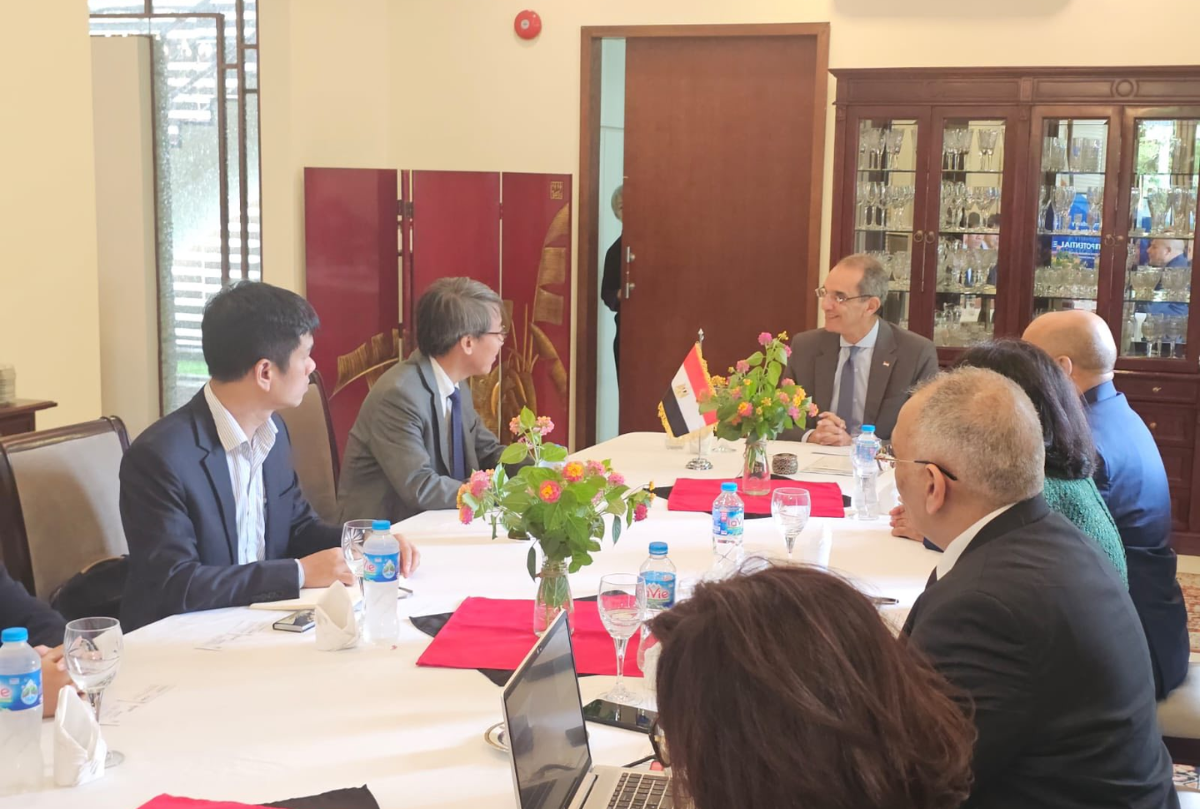Egypt’s ICT Minister Explores Investment Opportunities in Vietnam’s Technology Sector
Throughout these events, Egypt showcased its progress in addressing cybercrime through the establishment of specialized courts, prosecution offices, and law enforcement units, as well as through national and regional training programs for stakeholders across the justice system.

Egypt’s Minister of Communications and Information Technology, Dr. Amr Talaat, concluded an official visit to Hanoi, Vietnam, aimed at enhancing cooperation in telecommunications, electronics manufacturing, and digital transformation. The visit, attended by Ambassador of Egypt to Vietnam Hany Mostafa, included high-level meetings with global technology and electronics companies, as well as Egypt’s participation in international cybercrime discussions.
During the visit, Dr. Talaat met with Rimah Ghaddar, Managing Director of FPT Software Middle East, and several senior officials from FPT Corporation. The discussions centered on the company’s investments in Egypt in areas such as IT applications and the semiconductor industry, along with potential collaboration in digital capacity building. The meeting also reviewed FPT’s subsidiaries, including FPT Software, FPT Semiconductor, FPT Automotive, and FPT Education, which operates FPT University. Both parties explored opportunities for joint projects between Egyptian and Vietnamese companies targeting markets in Europe, the Middle East, and Africa, particularly within ICT, electronics, and electric vehicle (EV) technologies.
Dr. Talaat also met with Cao Anh Son, Deputy General Director of Viettel Group, and other executives to explore avenues for cooperation and investment in telecommunications, digital transformation, and advanced technologies. The discussions covered possible collaboration in electronics manufacturing, IC design, and 5G networks, as well as research and development (R&D) projects in Artificial Intelligence (AI) and the Internet of Things (IoT).
In another meeting, the ICT Minister visited Samsung Electronics Vietnam and met with Na Ki Hong, the company’s General Director, and senior officials. The talks focused on Samsung’s R&D strategy and investments in Vietnam, while also highlighting Egypt’s growing capabilities in local electronics manufacturing. Dr. Talaat emphasized the presence of major mobile phone manufacturers in Egypt, including Samsung itself, and toured Samsung’s smartphone manufacturing complex, where he examined the different stages of production and assembly.
Additionally, Dr. Talaat held discussions with Tran Huu Quyen, Chairman of the Board of Directors at VNPT, to discuss investment opportunities in electronics and telecommunications equipment manufacturing. The meeting underscored Egypt’s strengths, including its skilled digital workforce, advanced digital infrastructure, investment-friendly climate, and strategic geographic location. Both sides explored ways to leverage Egyptian expertise in VNPT’s projects and position Egypt as a regional hub for the company’s operations. The Minister was accompanied by Sherine El-Guindy, Assistant ICT Minister for Strategy and Implementation; Samah Aziz, Head of the Central Department of International Relations at MCIT; and Yasser AbdelBary, Head of the Electronics Industry Program at ITIDA.
On the international front, Dr. Talaat represented Egypt at the signing ceremony of the United Nations Convention against Cybercrime, held in Vietnam. Egypt also organized a session titled “From Breach to Verdict — Egypt’s Comprehensive Approach for International Cyber Justice and Regional Capacity,” which highlighted the country’s achievements in digital forensics and cyber investigations. In addition, Egypt participated in an exhibition showcasing its national capabilities in combating cybercrime.
The Egyptian delegation, including representatives from the Ministry of Justice, took part in two major side events. The first focused on “Sharing Experiences and Best Practices in Collecting Electronic Evidence in Cryptocurrency and Money Laundering Investigations,” attended by international officials such as Ghana’s Minister for Digital Technology and Innovations, the Regional Representative of the United Nations Office on Drugs and Crime (UNODC), and the Head of Law Enforcement Training at Binance. The second event, titled “Capacity Building and Technical Assistance,” featured the participation of deputy ministers and ambassadors from Russia, China, Vietnam, Cuba, and South Africa.
Throughout these events, Egypt showcased its progress in addressing cybercrime through the establishment of specialized courts, prosecution offices, and law enforcement units, as well as through national and regional training programs for stakeholders across the justice system. Egypt also highlighted the work of the Egyptian Thematic Committee on Preventing and Combating Cybercrime, which coordinates national efforts and plays a vital role in shaping the country’s strategic and operational approaches to cybersecurity.






